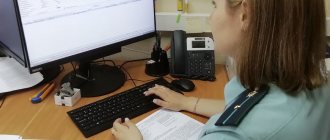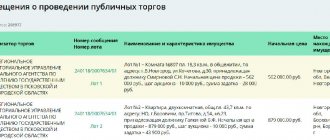If enforcement actions are suspended by a bailiff, the interested person may submit an application to resume enforcement proceedings. Of course, if the suspension of enforcement proceedings itself was illegal, it is better to file a complaint with the senior bailiff. The party to the proceedings uses an application for resumption if the grounds for suspension no longer exist.
Resumption means that the bailiff continues to take steps to enforce the court's decision. The deadlines are also renewed, and other actions are taken to satisfy the requirements of the writ of execution.
:
Application for resumption of enforcement proceedings
Grounds for renewing a completed individual entrepreneur
Initiation of completed proceedings against the debtor is possible at the initiative of the parties, if the factors for suspending the case have disappeared and have been cancelled. The right to start a retrial belongs to the bailiff or the collector. The grounds include:
- Changes in circumstances that caused the termination of the process.
- Cancellation of the writ of execution or court order that serves as the basis for completion.
- Submission of an application by the claimant, a representative of the FSSP.
- Obtaining a refusal of a claim for the release of property under arrest.
- The debtor regained its solvency.
- Expiration of the deferment period for fulfilling obligations proposed by the court.
- The defendant, previously put on the wanted list and missing in action, has been found.
Sample application for the resumption of enforcement proceedings
To the bailiff
Full name, name of the FSSP department, address
From: Full name, address (collector)
Enforcement proceedings No. XX
Statement
on the resumption of enforcement proceedings
The bailiff, full name, name of the FSSP department, XX.XX.2020, initiated enforcement proceedings No. XXX on the basis of writ of execution No. XX, issued by XX.XX.2020, XXX Federal District Court for the recovery of funds in the amount of ___ rubles from the debtor - full name , address in favor of the claimant.
XX.XX.2020, the bailiff, full name, issued a resolution to suspend enforcement proceedings in connection with _______.
Currently, the specified basis for suspending enforcement proceedings has been eliminated, which is confirmed by ______.
In accordance with paragraph 7 of Art. 45 of the Federal Law of October 2, 2007 No. 229-FZ “On Enforcement Proceedings”, suspended enforcement proceedings must be resumed after the circumstances that served as the basis for its suspension have been eliminated.
Based on the above and in accordance with paragraph 7 of Art. 45 of the Federal Law of October 2, 2007 No. 229-FZ “On Enforcement Proceedings”
ASK:
- Resume enforcement proceedings No. XXXX.
Applications:
- Copies of documents confirming the elimination of circumstances impeding enforcement proceedings.
Date, signature.
Rules for drawing up an appeal
The document is addressed to the body that suspended the case. It is sent to the court or to an FSSP officer. The application must be accompanied by certificates confirming the existence of grounds on which the case can be reinstated.
The form is not strictly defined and must be filled out by hand or on a computer. The language of presentation is formal; colloquial and slang expressions are not allowed. References to regulations are optional, but desirable (you can indicate articles of the law on enforcement proceedings).
You need to know this: Grounds for termination of enforcement proceedings. Art. 43 of the Federal Law of October 2, 2007 N 229-FZ (as amended on June 8, 2020)
Submission and review of claims
The document is prepared by the claimant or his representative by proxy in writing. Signed by an authorized person. There are several ways to submit your application. Through the office of the service, at a reception with the bailiff. You can also use the website of the Federal Bailiff Service for the region. After all, it is possible to attach photographic copies of documents.
The decision on the requirements of the party to the proceedings is made by the bailiff. He formalizes the decision by issuing a resolution. If the applicant’s arguments are not supported, again use complaints, incl. complaint about the inaction of the bailiff.
If the court suspended the proceedings, therefore, an application to resume enforcement proceedings must be submitted to the court, guided by Art. 438 Code of Civil Procedure of the Russian Federation.
Filling example
Sample statements after suspension and termination are slightly different. General – indication of the details of the plaintiff, defendant, court or bailiff (with the address of the department).
Hotline for citizen consultations: 8-804-333-70-30
Document after the suspension of the individual entrepreneur
The grounds for temporarily lifting restrictive measures are:
- Recognition of the debtor as missing (the case is resumed if the search is successful).
- Recognition as incompetent (it is possible to conduct a re-examination with different results).
- Participation of the defendant in hostilities on the side of the Russian Federation.
- Revocation of the bank's license.
- Beginning of the bankruptcy procedure (the individual entrepreneur is resumed if the person restores solvency, the insolvency was recognized as fictitious).
- A court decision to defer or installment payments (after its cancellation).
- The defendant is undergoing treatment in a hospital (the process begins after discharge).
What reasons for renewal can be given in the application?
Federal Law No. 229 in Article 40 establishes the grounds that may serve as a reason for resuming production. These include:
- the person against whom the court decision was made was previously in the combat zones, but at the time of sending the appeal returned from there;
- the debtor was discharged from the hospital where he was treated;
- the citizen was previously declared dead or missing by the court, but the court decision was overturned;
- at the time the debt arose, the person against whom the proceedings were opened was experiencing financial difficulties. But his solvency has improved;
- the court granted a deferment of execution of the decision, but its term has expired;
- the debtor served in the army and returned home at the time of filing the appeal;
- the person against whom the IP was initiated was wanted and was found;
- the debtor's organization has been arrested.
Based on the provisions of the law, both the judicial authorities and senior executive officials can suspend proceedings. This may happen due to a complaint about the bailiff’s inaction. In order for proceedings to be resumed, evidence of a change in circumstances and a settlement of the situation is needed. The body that will consider the complaint must not find grounds for suspension.
Applications
You will need to add documents to the application that serve as the basis for starting forced debt collection. These include:
- Writ of execution in civil proceedings.
- Confirmation of the defendant's discharge from an inpatient medical facility.
- The court's decision recognizing the bankruptcy procedure as fictitious.
- Bank account statements and other evidence confirming the existence of assets of the debtor.
- Bailiff's resolution on successful search for property.
- Expert conclusion declaring a person sane.
How to make an application?
A completed application form to resume proceedings under a writ of execution is submitted to the authorized bailiff. This applies if the decision was made precisely by his decision.
It is recommended to describe the entire process of the case in the text of the application, starting from the moment of filing a court decision to open an individual entrepreneur and the beginning of enforcement measures, ending with the completion of these measures.
The basis for starting proceedings will be facts confirming the elimination of the reasons for the suspension. In this regard, the applicant must attach all possible evidence to the application.
All materials are included in the case. Both one and the other party have the right to study them freely, having previously written an application to familiarize themselves with the materials on the enforcement proceedings.
Legal consequences of filing an application
In order for the case to be reopened, it is necessary to obtain the cancellation of the ruling. The application sent by the claimant must be considered no more than 15 days. To speed up the process, it is recommended not to send the application by mail, but to bring it in person to the service office.
At the end of the period for consideration of the application, the bailiff must resume the proceedings. This is possible if there are substantial grounds. In case of refusal to satisfy the requirements, the party has the right to send a complaint to the prosecutor's office about the inaction of the bailiffs or prepare a statement of claim to the court.
Submitting an application to resume proceedings is an opportunity for the recovery party to assert its rights.
Video on how to write petitions during enforcement proceedings:
Dear readers! Our articles talk about typical ways to resolve legal issues, but each case is unique.
It's fast and free!
- Grounds for renewing a completed individual entrepreneur
- Time frame for resuming the process
- Rules for drawing up an appeal
- Filling example
- Document after the suspension of the individual entrepreneur
- Document after the end of production
- Applications
- Application procedure
Deadlines for renewing IP for alimony
The legislator allows only 3 years for the renewal of a suspended individual entrepreneur. The countdown begins from the moment when the circumstances that impede enforcement proceedings no longer exist.
At the same time, no deadline has been specified for the resumption of enforcement proceedings on alimony. The fact is that it is resumed immediately after receiving a corresponding request from the claimant.
If the deadline is missed, the claimant has the opportunity to restore it. To do this, you will have to go to court with a corresponding application. Naturally, missing deadlines must have a good reason:
- severe illness that precludes timely treatment;
- long business trip, etc.
Important! The court makes a decision on the validity of missing deadlines in each specific case, based on an objective assessment of the stated circumstances.
How is alimony proceedings resumed?
An application for the resumption of alimony collection is submitted by a person interested in its resumption even after the disappearance of the above circumstances. If the debtor demanded the suspension of the collection, for example, challenging the bailiff’s decision, then the collector has the right, after considering the complaint, to demand the renewal of the lien if the bailiff misses the moment and does not resume the case.
An application to resume enforcement proceedings is submitted:
- to the court that suspended it, if the suspension was inspired by the court;
- to the FSSP at the place of production of the isp. actions if the case is frozen by the decision of the bailiff.
What to do if production is suspended illegally
In a number of cases, the FSSP unlawfully suspends individual entrepreneurs for the collection of alimony. As a rule, this is due to the heavy workload on bailiffs and their reluctance to work if:
- the alimony payer is hiding;
- the location of the alimony payer is unknown;
- The alimony payer has no income or property.
An FSSP employee may not only unreasonably suspend proceedings, but also refuse to resume them. You can resist such illegal actions by filing a complaint with the senior bailiff.
The appeal algorithm is quite simple.
- File a complaint about the actions or inaction of the bailiff. The document must indicate information about the suspension of enforcement proceedings and provide circumstances confirming the illegality of the decision. The complaint ends with a request to resume enforcement proceedings.
- Send the complaint by registered mail with an inventory and return receipt. The document can also be submitted in person at the reception of the senior bailiff, or sent via the Internet on the FSSP website.
- Get an answer. If the complaint remains unsatisfied, you can contact a higher-ranking officer. The final “verdict” is made by the chief bailiff of Russia.
In most cases, one complaint to the senior bailiff is enough to encourage the FSSP employee to conscientiously perform his official duties. Sooner or later, the alimony payer finds himself and begins to pay, since for malicious evasion of alimony payment the debtor faces criminal liability under Article 157 of the Criminal Code of the Russian Federation.
Bottom line
If the alimony case was suspended by the court, it will be resumed automatically. It will be enough for the claimant to monitor the execution of the relevant duties by the bailiff. When the withholding of funds is suspended by a decision of the bailiff, he is recommended to send an application to resume actions to obtain the amounts necessary for the child.
Sources
- https://katsaylidi.ru/article/vozobnovlenie-okonchennogo-ispolnitelnogo-proizvodstva
- https://JuristPomog.com/administrative/obrazets-zayavleniya-o-vozobnovlenii-ispolnitelnogo-proizvodstva.html
- https://nsovetnik.ru/ispolnitelnoe_proizvodstvo/sostavlenie-i-podacha-zayavleniya-o-vozobnovlenii-ispolnitelnogo-proizvodstva/
- https://pro-gosposhliny.ru/v-sude/zayavlenie-o-vozobnovlenii-ispolnitelnogo-proizvodstva
- https://Pravda-Zakona.ru/article/trebovanie-o-vozobnovlenii-ispolnitelnogo-proizvodstva-po-alimentam.html
- https://SocPrav.ru/kak-vozobnovit-ispolnitelnoe-proizvodstvo-po-alimentam
- https://allo-urist.com/zayavlenie-o-vozobnovlenii-ispolnitelnogo-proizvodstva-po-alimentam/
- https://ros-nasledstvo.ru/zayavlenie-o-vozobnovlenii-ispolnitelnogo-proizvodstva-po-alimentam/
- https://YaiZakon.ru/alimenty/vozobnovlenie-ispolnitelnogo-proizvodstva
[collapse]
Expert opinion
Many creditors are faced with the suspension of their individual entrepreneurs. And in an attempt to resume it, they make mistakes.
In order to achieve the resumption of execution of a court decision (agreement on alimony), it is worth acting competently, which is easily achievable with the help of a lawyer. Consultations on issues related to the restoration of individual entrepreneurs are especially necessary if the suspension occurred on the basis of a court order.
A professional lawyer, after analyzing the situation, will tell you what to do correctly in the current circumstances. He will give advice on:
- collection of documentary evidence on the basis of which it is possible to legitimately demand the resumption of proceedings;
- preparing an application;
- appealing a refusal to renew.
Due to frequent updates to legislation and the legal uniqueness of each situation, we recommend obtaining a free telephone consultation with a lawyer. You can ask your question by calling the hotline number 8 (800) 555-40-36 or write it in the form below.
On what grounds is enforcement proceedings suspended?
Enforcement proceedings are suspended on the grounds provided, in particular, by the Law on Enforcement Proceedings for the court and for the bailiff. To suspend enforcement proceedings for a number of reasons (mandatory suspension), the very fact of their occurrence is important. But there are also optional grounds when the suspension depends on the conviction of the court or bailiff in their necessity. In the latter case, it is important for the applicant to prove such a necessity (for example, the impossibility of returning everything to its original position if the performance is completed).
1. Grounds for suspension of enforcement proceedings by the court The grounds for suspension of enforcement proceedings by the court are specified in Art. 39 of the Law on Enforcement Proceedings. There are grounds upon which the court is obliged to suspend enforcement proceedings. There are other grounds for which the suspension of enforcement proceedings is the right of the court. If the enforcement proceedings are consolidated, then the court, as a general rule, will suspend it only in the contested part (Part 3 of Article 39 of the Law on Enforcement Proceedings).
1.1. In what cases should the court suspend enforcement proceedings? The court suspends enforcement proceedings in whole or in part in the following cases (Part 1 of Article 39 of the Law on Enforcement Proceedings): 1) a claim is filed for release from seizure (exclusion from the inventory) of the property that is being seized . It seems that in this case the enforcement proceedings can be partially suspended - only in relation to the disputed property, which is the subject of the claim; 2) the result of the assessment of the seized property is disputed. The parties have the right to challenge the assessment report in the manner of litigation or to challenge the decision of the bailiff (clause 50 of the Resolution of the Plenum of the Supreme Court of the Russian Federation dated November 17, 2015 N 50). Despite the fact that in Part 1 of Art. 39 of the Law on Enforcement Proceedings speaks of cases when enforcement proceedings are “subject to suspension”; often courts do not consider the fact of challenging the assessment results as an unconditional basis for suspension (Resolution of the Arbitration Court of the East Siberian District dated January 11, 2018 N F02-7273/2017). In this case, the courts are guided by paragraph 50 of the Resolution of the Plenum of the Supreme Court of the Russian Federation dated November 17, 2015 N 50, which uses the expression “the court has the right.” To convince the court to suspend, it is worth referring to the fact that when challenging the result of an assessment, it is not necessary to suspend the entire enforcement proceeding; it is enough to do this in part - in relation only to the property whose assessment is being disputed; 3) the decision to collect the enforcement fee is disputed. In this case, enforcement proceedings are suspended only in relation to the collection of the fee, since the appeal cannot influence the execution in favor of the collector. Other cases can only be provided for by federal law (clause 4, part 1, article 39 of the Law on Enforcement Proceedings).
1.2. In what cases can the court suspend enforcement proceedings? The court can suspend enforcement proceedings in whole or in part in the cases provided for in Part 2 of Art. 39 of the Law on Enforcement Proceedings. However, these are not unconditional grounds for suspending enforcement proceedings. Therefore, in order to suspend enforcement proceedings, you must convince the court that this is necessary and support your arguments with evidence. Suspension is possible if: 1) the executive document or judicial act on the basis of which the executive document was issued is disputed. Thus, the arbitration court of appeal may suspend the execution of a judicial act if the writ of execution has already been issued by the court of first instance (clause 30 of the Resolution of the Plenum of the Supreme Court of the Russian Federation dated November 17, 2015 N 50). But to do this, it is necessary to justify the impossibility or difficulty of reversing the execution or to provide security in case of possible losses of the claimant, for example, a bank guarantee (Parts 1, 2 of Article 265.1 of the Arbitration Procedure Code of the Russian Federation). If the execution of a judicial act is suspended, enforcement proceedings are also suspended (clause 29 of the Resolution of the Plenum of the Supreme Court of the Russian Federation dated November 17, 2015 N 50). The court of first instance may suspend enforcement proceedings in cases of challenging the executive document of a non-judicial body (clause 29 of the Resolution of the Plenum of the Supreme Court of the Russian Federation dated November 17, 2015 N 50); 2) the act of the body or official who examined the case of an administrative offense is disputed. Based on the results of the challenge, the court may declare the decision to impose administrative liability illegal and cancel or change it. The court may take these circumstances into account and suspend enforcement proceedings. But, as a rule, the courts find no reason for this. However, in most of the cases we studied, the debtors did not present any evidence to support their arguments. If you ask to suspend enforcement proceedings to collect a large fine from you, you can prepare documents for the court confirming the negative impact of paying this amount on the financial position of your organization. In particular, prepare account statements, contracts that require payment in the near future, reconciliation reports, etc.; 3) the debtor is on a long business trip. This paragraph is applicable to debtors - individuals or individual entrepreneurs, since it is related to the personality of the debtor. Within the meaning of clause 3, part 2, art. 39 of the Law on Enforcement Proceedings, the presence of the head of the debtor (applicant) on a business trip is not grounds for suspending enforcement proceedings; 4) an application to challenge the bailiff’s decision, his actions (inaction), or refusal to take action has been accepted for processing. Suspension of enforcement proceedings is permissible only if its execution is impossible until the dispute with the bailiff is resolved. Thus, challenging the action of a bailiff to combine several enforcement proceedings into a consolidated one should not be an obstacle to the execution of each of them separately (regardless of the legality or illegality of the merger of proceedings); 5) there is an appeal for clarification of the provisions of the executive document, the method and procedure for its execution to the body that issued it. The claimant, the debtor or the bailiff can seek clarification (clause 5, part 2, article 39 of the Law on Enforcement Proceedings). It appears that the court may suspend enforcement proceedings in exceptional cases. For example, when it is unclear what kind of property is subject to seizure, and therefore the interests of third parties may be affected; 6) there are grounds for the bailiff to suspend enforcement proceedings (clause 6, part 2, article 39 of the Law on Enforcement Proceedings).
2. In what cases do the courts refuse to suspend enforcement proceedings? A number of circumstances can be identified that the courts do not consider as grounds for suspending enforcement proceedings, for example: 1) the debtor submits an application to defer the execution of a court decision (Resolution of the Arbitration Court of the North-Western District dated 01.12 .2015); 2) appealing the ruling to refuse installment execution (Resolution of the Arbitration Court of the North-Western District dated 09/06/2018 N F07-9124/2018); 3) filing a claim to invalidate the contract of assignment of the right of claim (cession), on the basis of which the claimant was replaced in enforcement proceedings (Resolution of the Federal Antimonopoly Service of the Far Eastern District dated April 18, 2014 N F03-1364/2014); 4) the applicant’s appeal to the authorities of the Ministry of Internal Affairs of Russia with a statement about the commission of fraudulent actions by officials of the claimant (Resolution of the Arbitration Court of the West Siberian District of August 20, 2015 N F04-8433/2013); 5) initiation of a criminal case against unidentified persons from among the debtor’s management (Resolution of the Arbitration Court of the Moscow District dated 03/07/2018 N F05-2675/2016); 6) filing a claim for recognition of ownership of a disputed building is not a basis for suspending enforcement proceedings for its demolition (Decision of the Supreme Court of the Russian Federation dated December 3, 2019 N 50-KG19-6, Resolution of the Arbitration Court of the Far Eastern District dated June 26, 2018 N F03-2264 /2018).
3. Grounds for suspension of enforcement proceedings by a bailiff. Grounds for suspension of enforcement proceedings by a bailiff are specified in Art. 40 of the Law on Enforcement Proceedings. There are grounds upon which the bailiff is obliged to suspend enforcement proceedings, and there are those under which he makes a decision at his own discretion. Consolidated enforcement proceedings can be suspended only by the chief bailiff of the Russian Federation, a constituent entity of the Russian Federation and their deputies only in the contested part (Part 3 of Article 40 of the Law on Enforcement Proceedings).
3.1. In what cases should a bailiff suspend enforcement proceedings? A bailiff must suspend enforcement proceedings in whole or in part in the cases provided for in Part 1 of Art. 40 of the Law on Enforcement Proceedings. In particular, this is: the death of the debtor, declaring him dead or recognizing him as missing, if succession is allowed. The possibility of succession is determined based on the substance of the claims against the debtor or his obligations. For example, the obligation to pay a debt may pass to the heirs of a deceased debtor, which means that in this case the enforcement proceedings will be suspended; revocation of the debtor's license to carry out banking operations. Please note that debt collection on the bank’s current obligations will continue (Article 20 of the Law on Banks and Banking Activities); application in relation to the debtor-organization of bankruptcy procedures of supervision, financial rehabilitation or external management. This does not apply to enforcement proceedings for a number of requirements of executive documents that arose before the introduction of these procedures. These include demands for payment of royalties, for reclaiming property from someone else’s illegal possession, for compensation for harm caused to life or health, for collection of arrears on current payments, wages (Part 1 of Article 96 of the Law on Enforcement Proceedings); acceptance by the court for consideration of the debtor's claim for deferment, installment plan, exemption from collection of the enforcement fee, reduction of its size; extending to the debtor a moratorium on initiating bankruptcy proceedings.
3.2. In what cases can a bailiff suspend enforcement proceedings? A bailiff can decide to suspend at his own discretion in the cases provided for in Part 2 of Art. 40 of the Law on Enforcement Proceedings. In particular, this is: search for the debtor or his property; sending an order to carry out enforcement actions (apply enforcement measures) to another department of bailiffs. The chief bailiff of the Russian Federation, a constituent entity of the Russian Federation and their deputies have the right to suspend enforcement proceedings if a complaint is received against the resolution or the actions (inaction) of their subordinates (Part 3 of Article 40 of the Law on Enforcement Proceedings).
4. Suspension of enforcement proceedings due to a moratorium on the initiation of bankruptcy proceedings If the debtor is subject to a moratorium on the initiation of bankruptcy proceedings, then the enforcement proceedings for property collections on claims that arose before the introduction of the moratorium are suspended. At the same time, seizures of property and other restrictions on the disposal of the debtor’s property imposed during enforcement proceedings are not lifted (clause 4, clause 3, article 9.1 of the Bankruptcy Law). However, the debtor may refuse to apply the moratorium. To do this, he needs to submit a corresponding application. After entering information about the refusal into the Unified Federal Register of Bankruptcy Information, the moratorium does not apply to the debtor, restrictions on the rights and obligations of the debtor and his creditors, provided for, in particular, clause 3 of Art. 9.1 of the Bankruptcy Law do not apply (paragraph 3, clause 1, article 9.1 of the said Law).
Who has the right to renew
Enforcement proceedings can be resumed on the bailiff’s own initiative or at the request of the claimant (clause 7 of Article 45 of the Law on Enforcement Proceedings).
To resume enforcement proceedings, you must contact the body that previously suspended or terminated it (clause 2 of Article 42 of the Law on Enforcement Proceedings). It could be:
- the bailiff who issued a decision to terminate enforcement proceedings; or
- The court that made the relevant decision.
When can the bailiff finish enforcement proceedings?
The bailiff formalizes the termination of enforcement proceedings by issuing a termination order, in which the bailiff indicates the grounds for termination with reference to the law. The grounds for termination may be the following:
- Actual execution of the court decision in full;
- Impossibility of collection due to the lack of property from the debtor in an amount sufficient to fulfill the obligation;
- Death or bankruptcy of an individual debtor
- Liquidation or bankruptcy of a legal entity
Obstacles to the execution of a court decision must be justified by materials of enforcement proceedings, such as, for example, an act on the impossibility of collecting the amount of debt from the debtor, the absence of a positive result in the search for the property of the debtor or child. Moreover, even if these facts are proven, this does not mean that the situation is hopeless.






